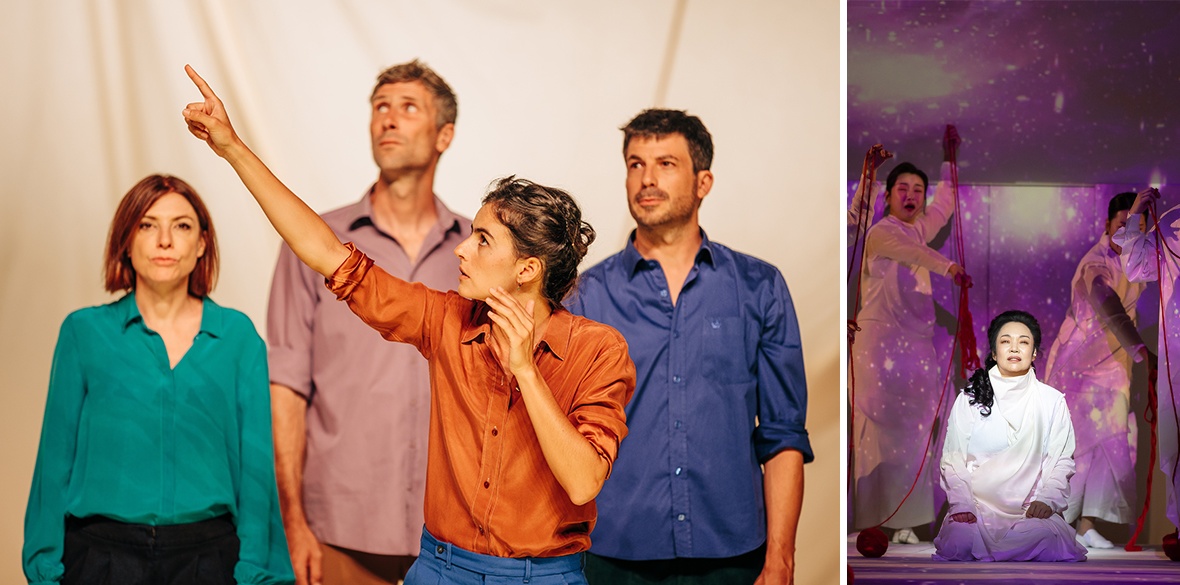This is the last article you can read this month
You can read more article this month
You can read more articles this month
Sorry your limit is up for this month
Reset on:
Please help support the Morning Star by subscribing here
HARD on the heels of the NT show Grenfell: In The Words Of The Survivors comes another astonishing epic of verbatim theatre, As Far As Impossible (★★★★★), Tiago Rodrigues’s rendition of interviews with humanitarian aid workers from the Red Cross and Medecins Sans Frontiers.
Like in Grenfell, actors play multiple interviewees and the result is so urgent and compelling that it is tempting to see this very contemporary convention as heralding a new genre in political theatre and a next step after Brecht.
This theatre has learned from the East German master. The “distance” of actor from role is immediately established, allowing a man to play a woman or, controversially, a white woman to play a black woman. The performance is simply enactment; the words themselves are evidence.
It also allows for “Epic” generalisation, and Rodriguez takes every specific mention of place (Syria, Colombia, Afghanistan, Bosnia and Rwanda are obviously, if not explicitly referred to) is glossed as the zone of “the impossible,” in which normal medical services and conditions no longer exist. This allows the play to step beyond the particular conditions of a conflict and to study trauma, and how if affects those who do such work.
It also emphasises class difference on a global scale. Those from “the possible” are middle-class Europeans who enjoy both education and vocational thrill-seeking, privileges that are not available in “the impossible,” and the temptation of adventure reflects the privilege of the audience itself.
But the experiences are intolerable, and futile. The challenge of the “the impossible” is too drastic and the effect of individual effort, and even collective effort, is too insignificant to achieve a change. This painful paradox gives licence to torture the audience with vicarious thrills they crave, but cannot bear.
Rodriguez represents this not only with compellingly crafted accounts but also the war metaphor supplied by the one man on stage who says nothing, the percussionist Gabriel Ferrandini, who performs with breathtaking virtuosity. The gunfire rat-a-tat of his free drumming strands us for unbearable durations in middle-class discomfort.
But the most striking aspect of Rodgriguez’s exercise in verbatim theatre is its classical formal elegance. It’s like watching Racine.
Instead of watching aristocratic heroes, we have bourgeois heroes whose virtue cannot be denied. Instead of reporting carnage and sea monsters like in Phedre, they report carnage and humanitarian work whose authenticity is never in doubt.
And like classical theatre it lays out its own unities of time and place. This play will have three acts, namely: “I want to change the world,” “I cannot change the world” and “the world cannot be changed”. At the beginning one of the characters proposes this as the inevitable structure of the experience and it underlies the subsequent course of the narrative.
And because this production is a masterpiece it develops through progressively more evocative scenes. The stage seems to get bigger and bigger, and the demands placed on both actors and audience more intense and demanding. Towards the end a Red Cross group must call for a ceasefire to rescue an injured child. The silence that replaces the gunfire is not a void, but the highly charged silence of an audience keenly attending to events.
It’s a miracle, but nothing is learned from it and once the medics depart hostilities recommence.
This kind of theatre is recognisably “Brechtian” in its clarity of exposition, alienation effect and simple, epic stagecraft. But the words no longer come from an author, and this is a significant invention. Because they come from reality it allows the play to access a completely new experience of the tragic effect and opens up a genre that is political, engaged and cathartic.
In contrast, that compelling connection to reality is entirely absent in the National Changgeuk Company of Korea’s production of Euripedes’s The Trojan Women (★).
This play is frequently revived as a classical commentary on contemporary conflict but here is served up as spectacle and stripped of relevance. The only point of interest is that the attenuated text is half-sung, half howled by a static cast, and this is presented as an exotic taste of an oriental “tradition.” But there is nothing traditionally Korean about Euripedes, nor about the fact that it plays out against a banal backdrop of screen-savers, nor the “Ladyboy of Bangkok” touch of playing Helen as a man.
Smoke and mirrors super-changed with camp and dished up as touristic fare that only those colonised by the US could mistake for culture.
As Far As Impossible runs until August 14; Info: eif.co.uk; The Trojan Women run ended







